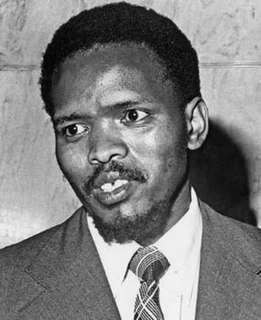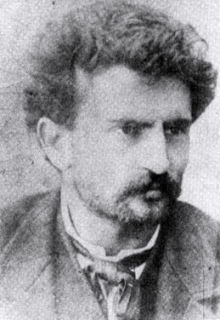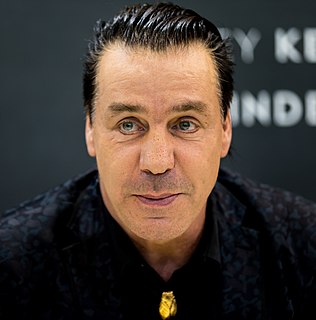Top 288 Individualism Quotes & Sayings - Page 5
Explore popular Individualism quotes.
Last updated on November 19, 2024.
Among other grand achievements, F. A. Hayek had a remarkable career pointing out the flaws in collectivism. One of his keenest insights was that, paradoxically, any collectivist system necessarily depends on one individual (or small group) to make key social and economic decisions. In contrast, a system based on individualism takes advantage of the aggregate, or 'collective,' information of the whole society; through his actions each participant contributes his own particular, if incomplete, knowledge-information that could never be tapped by the individual at the head of a collectivist state.
The Democrat Party is willing to undermine whatever, if it'll get them back to power and keep them there. The Democrat Party's willing to undermine anything because, never forget: They need a permanent underclass. Do not doubt me. The Democrat Party is threatened by people who learn to take care of themselves. Self-reliance. The Democratic Party is threatened by people who learn rugged individualism.
Given that the nineteenth century was the century of Socialism, of Liberalism, and of Democracy, it does not necessarily follow that the twentieth century must also be a century of Socialism, Liberalism and Democracy: political doctrines pass, but humanity remains, and it may rather be expected that this will be a century of authority ... a century of Fascism. For if the nineteenth century was a century of individualism it may be expected that this will be the century of collectivism and hence the century of the State.
Just recognizing and naming that many of the things we treat as historical fact are stories can help erode their power over our sense of identity and thinking. If they are stories rather than "truth," we can write new stories that better represent the country we aspire to be. Our new stories can be about diverse people working together to overcome challenges and make life better for all, about figuring out how to live sustainably on this one planet we share, and on deep respect for cooperation, fairness, and equity instead of promoting hyper-competitive individualism.
The scientific world, the materialistic world, the world of commerce, the world of business, the world of individualism, the world of capitalism, world of communism - all these worlds are the old story now. Where we think we exploit nature, we exploit people. Market rules, profit rules, money rules. We work for name, fame, power, money, profit. That's the old story.
There is no hope for the world unless and until we formulate, accept and state publicly a true moral code of individualism, based on man's inalienable right to live for himself. Neither to hurt nor to serve his brothers, but to be independent of them in his function and in his motive. Neither to sacrifice them for himself nor to sacrifice himself for them.
Psychologism is, I believe, correct only in so far as it insists upon what may be called 'methodological individualism' as opposed to 'methodological collectivism'; it rightly insists that the 'behaviour' and the 'actions' of collectives, such as states or social groups, must be reduced to the behaviour and to the actions of human individuals. But the belief that the choice of such an individualist method implies the choice of a psychological method is mistaken.
Self-confidence is inseparable from submission to the creedal order, and through that order, to the supreme authority expressed in that order. ... Deep individualism cannot exist except in relation to the highest authority. No inner discipline can operate without a charismatic institution, nor can such an institution survive without that supreme authority from a relation to whom self-confidence derives. Without an authority deeply installed, there is no foundation for individuality. Self-confidence thus expresses submission to supreme authority.
When I was a kid, I used to live in New York City. There was a guy named Michael Alig. He used to throw parties. And a couple of times, I even worked for him and his crew, and handed out fliers, and had my super-high shoes on, and wearing silver Saran Wrap around my head or something. It's a world I was really comfortable in: a world full of individuals. I think what I like about that world - besides my own personal interests - is the individualism, the investment in the self.
We regard our living together not as an unfortunate mishap warranting endless competition among us but as a deliberate act of God to make us a community of brothers and sisters jointly involved in the quest for a composite answer to the varied problems of life. Hence in all we do we always place man first and hence all our action is usually joint community oriented action rather than the individualism.
Conservatives or better, pro-corporate apologists hijacked the vocabulary of Jeffersonian liberalism and turned words like "progress," "opportunity," and "individualism" into tools for making the plunder of America sound like divine right. This "degenerate and unlovely age," as one historian calls it, exists in the mind of Karl Rove the reputed brain of George W. Bush as the seminal age of inspiration for politics and governance of America today.
The Internet is the best thing that ever happened to China. It turns us into individuals and also enables us to share our perceptions and feelings. It creates a culture of individualism and exchange even though the real society doesn't promote it. There isn't a single Chinese university that can invite me to give a talk. Even though I know there are many students who would like to hear what I have to say.
Never before has the seductive market way of life held such sway in nearly every sphere of American life. This marketing way of life promotes addictions to stimulation and obsessions with comfort and convenience ... centered primarily around bodily pleasures and status rankings. ... The common denominator is a rugged and ragged individualism and rapacious hedonism in quest of a perennial "high" in body and mind.
The fundamental purpose of Marxism is the total control of a population under the belief that individualism and free markets lead to great disparities and inequalities and injustices and unfairness. Now, this is the outward appeal. Marxism is evil, and Marx knew it, but the appeal that seduces people is its justice and equality and fairness. What they don't tell you is the equality is spread equally to the point everybody's miserably equal and miserably the same.
It is odd that a value/virtue that plays such a central role in dramatic literature has played such a small role in philosophical writing. There are probably a number of reasons, but I think that a predilection for a certain kind of individualism is a major one. Others might include the fashionability of consequentialism, the idea that loyalty has more to do with sentiment than reason, as well as its proneness to corruption. The revival of interest in virtue/character as distinct from rules/principles has also created space for a renewed, if hesitant, interest in loyalty.
In the modern industrialized Western world, where I come from, the person whom you choose to marry is perhaps the single most vivid representation of your own personality. Your spouse becomes the most gleaming possible mirror through which your emotional individualism is reflected back to the world. There is no choice more intensely personal after all, than whom you choose to marry; that choice tells us, to a large extent, who you are.
Men towering high above such political pygmies, men of refinement, of culture, of ability, are jeered into silence as mollycoddles. It is absurd to claim that ours is the era of individualism. Ours is merely a more poignant repetition of the phenomenon of all history: every effort for progress, for enlightenment, for science, for religious, political, and economic liberty, emanates from the minority, and not from the mass. Today, as ever, the few are misunderstood, hounded, imprisoned, tortured, and killed.
The great Christian art did not die because all possible forms had been used up; it died because faith was being transformed into piety. Now, the same conquest of the outside world that brought in our modern individualism, so different from that of the Renaissance, is by way of relativizing the individual. It is plain to see that man's faculty of transformation, which began by a remaking of the natural world, has ended by calling man himself into question.
If you say the world is totally dependent on oil in many parts of the world, coal and certainly natural gas, we are fossil fuel, that is modernity, modernity has two elements: individualism and oil. Now to move toward a more enlightened sustainable world, we have to transform with lots of technology, with even differences in the way we see the world and how we live in the world. That`s going to take decades.
...[Changers] were a threat to identity, a challenge to the individualism even of those they were never likely to impersonate. It had nothing to do with souls or physical or spiritual possession; it was, as the Idirans well understood, the behavouristic copying of another which revolted. Individuality, the thing which most humans held more precious than anything else about themselves, was somehow cheapened by the ease with which a Changer could ignore it as a limitation and use it as a disguise.
A Call for Revolution, 1993 Libertarianism is rejected by the modern left - which preaches individualism but practices collectivism. Capitalism is rejected by the modern right - which preaches enterprise but practices protectionism. The libertarian faith in the mind of man is rejected by religionists who have faith only in the sins of man. . . . The libertarian insistence that each man is a sovereign land of liberty, with his primary allegiance to himself, is rejected by patriots who sing of freedom but also shout of banners and boundaries.
Protestant Christianity, whether in its liberal or conservative garb, finds itself waking up each morning in bed with a deteriorating modern culture, between sheets with a raunchy sexual reductionism, despairing scientism, morally normless cultural relativism, and self-assertive individualism. We remain resident aliens, OF the world but not profoundly in it, dining at the banquet table of waning modernity without a whisper of table grace. We all wear biblical name tags (Joseph, David, and Sarah), but have forgotten what our Christian names mean.
It is interesting to note that the "sexual revolution" was sometimes portrayed as a communal utopia, whereas in fact it was simply another stage in the historical rise of individualism. As the lovely word "household" suggests, the couple and the family would be the last bastion of primitive communism in liberal society. The sexual revolution was to destroy these intermediary communities, the last to separate the individual from the market. The destruction continues to this day.
In our rough and rugged individualism, we think of gentleness as weakness, being soft and virtually spineless. Not so! Gentleness includes such enviable qualities as having strength under control, being calm and peaceful when surrounded by a heated atmosphere, emitting a soothing effect on those who may be angry or otherwise beside themselves, and possessing tact and gracious courtesy that causes others to retain their self-esteem and dignity. Instead of losing, the gentle gain. Instead of being ripped off and taken advantage of, they come out ahead!
We can have intellectual individualism and the rich cultural diversities that we owe to exceptional minds only at the price of occasional eccentricity and abnormal attitudes. When they are so harmless to others or to the State as those we deal with here, the prices is not too great. But freedom to differ is not limited to things that do not matter much. That would be a mere shadow of freedom. The test of its substance is the right to differ as to things that touch the heart of the existing order.
The difference between neoliberalism and fascism or Nazism or other forms of totalitarianism is that it takes questions of ideology seriously. It takes the educational sphere seriously, and it tells people there's no alternative; that market freedom is really freedom in general; that a rabid kind of individualism is all that matters; that as Ayn Rand used to say, "self interest is the ultimate virtue" - and people believe this stuff. Because they have no other discourse.
I have visited sweatshops, factories, and crowded slums. If I could not see it, I could smell it. The foundation of society is laid upon a basis of . . . individualism, conquest and exploitation . . . A social order such as this, built upon such wrong and basic principles, is bound to retard the development of all. The output of a cotton mill or a coal mine is considered of greater importance than the production of healthy, happy-hearted and free human beings. We, the people, are not free. Our democracy is but a name.
Collectivists would have you believe that individualism is merely another word for selfishness, because individualists oppose welfare and other forms of coercive redistribution of wealth, but just the opposite is true. Individualists advocate true charity, which is the voluntary giving of their own money, while collectivists advocate the coercive giving of other people's money; which, of course, is why it is so popular.
There are also two Christianities in the world today. There is (1) the Christianity of the New Testament, and there is (2) the Christianity of accommodation to modernism, egalitarianism, niceness, naturalism, pop psychology, secular humanism, relativism, subjectivism, individualism, "Enlightenment" rationalism or postmodern irrationalism. New converts to the first Christianity are constantly amazed and scandalized by finding many of their clergy to be in love with the second and in fear of the first.
Because of social pressure, individualism is rejected by most people in favor of conformity. Thus the individual relies mainly upon the actions of others and neglects the meaning of his own personal life. Hence he sees his own life as meaningless and falls into the “existential vacuum” feeling inner void. Progressive automation causes increasing alcoholism, juvenile delinquency, and suicide.
In the anarchist milieu, communism, individualism, collectivism, mutualism and all the intermediate and eclectic programmes are simply the ways considered best for achieving freedom and solidarity in economic life; the ways believed to correspond more closely with justice and freedom for the distribution of the means of production and the products of labour among men. Bakunin was an anarchist, and he was a collectivist, an outspoken enemy of communism because he saw in it the negation of freedom and, therefore, of human dignity.
When I was an adolescent, I was obsessed with having many commercial things, cars, clothes, stupid things. Now that I have all that, I understand that the superfluous things can turn to you into a very stupid idiot-type. In East Germany there were very few things, but there was also a feeling of solidarity that no longer exists. Now we are up to the neck in consumption, the ego, the individualism. Now before friendship, it is merchandise.
Rather than ennobling the public mind and cementing the social fabric, applied science speedily became the chief weapon of a gross individualism, which was anathema to the frugal and righteous (John Quincy) Adams, the source of enormous fortunes divorced from duty, the instrument of unscrupulous ambition and rapacious materialism. Presently, it came to scar the very of the country which Adams loved, a disfiguring process uninterrupted since his day.
But the young educated adults of the 90s -- who were, of course, the children of the same impassioned infidelities and divorces Mr. Updike wrote about so beautifully -- got to watch all this brave new individualism and self-expression and sexual freedom deteriorate into the joyless and anomic self-indulgence of the Me Generation. Today's sub-40s have different horrors, prominent among which are anomie and solipsism and a peculiarly American loneliness: the prospect of dying without once having loved something more than yourself.
The form of government that is most suitable to the artist is no government at all. ... One might point out how the Renaissance was great, because it sought to solve no social problem, and busied itself not about such things, but suffered the individual to develop freely, beautifully, and naturally, and so had great and individual artists, and great, individual men. One might point out how Louis XIV, by creating the modern state, destroyed the individualism of the artist.
Unrestrained automobility, hedonism, individualism, and conspicuous consumption cannot be sustained because they take more than they give back. A spiritually impoverished world cannot be sustained because meaninglessness, anomie, and despair will corrode the desire to be sustained and the belief that humanity is worth sustaining. But these are the very things that distinguish the modern age from its predecessors, Genuine sustainability, in other words, will come not from superficial changes but from a deeper process akin to humankind growing up to a fuller stature.
I think we need to find a way to provide people with a reason that the average man on the street can grasp and embrace, that would cause him to move away from the centuries-old idea of the individual and individualism, and move toward a different concept of what it means to be human in a collective society. Unless he has that reason, unless he has a fundamental reason to do that, it's going to be very difficult to cause him to make that shift, in my view.
Liberals tend to understand that a person can be lucky or unlucky in all matters relevant to his success. Conservatives, however, often make a religious fetish of individualism. Many seem to have absolutely no awareness of how fortunate one must be to succeed at anything in life, no matter how hard one works. One must be lucky to be able to work. One must be lucky to be intelligent, physically healthy, and not bankrupted in middle age by the illness of a spouse.
Socialism, whether it's the 'soft tyranny' of the EuroAmerican management state or the murderously repressive forms taken by Hitler, Stalin, Mao, or Pol Pot, is all about disindividuation, a steady, relentless erasure of the individual differences among us, everything that makes us who we are. 'Everybody in, nobody out!' is the marching mantra of militant collectivized medicine, but it accurately describes all other aspects of collectivism as well. No alternatives allowed, no choices, no individualism, no individuality, and ultimately, no individuation.
Rush Limbaugh is a principled conservative, master broadcaster and stinging social critic who has won his mammoth following through his own energy, individualism and wit. His daily radio show is the one reliable place ordinary citizens can turn to for a different perspective in the blizzard of propaganda and disinformation from the Northeastern media establishment. History will show that Limbaugh was a major force over the past decade in waking this country up from its p.c. coma.
The public school system: "Usually a twelve year sentence of mind control. Crushing creativity, smashing individualism, encouraging collectivism and compromise, destroying the exercise of intellectual inquiry, twisting it instead into meek subservience to authority." - Walter Karp, Editor Harper's Magazine
The ground of liberty is to be gained by inches, and we must be contented to secure what we can get from time to time and eternally press forward for what is yet to get. It takes time to persuade men to do even what is for their own good.
I started to see human beings as little lonesome, water based, pink meat, life forms pushing air through themselves and making noises that the other little pieces of meat seemed to understand. I was thinking to myself, 'There's five billion people here but we've never been more isolated.' The only result of the aggressive individualism we pursue is that you lose sight of your compassion and we go to bed at night thinking, 'Is this all there is?' because we don't feel fulfilled.
I have nothing but myself to write about, no facts, no theories, no opinions, no adventures, no sentiments, nothing but my own poor barren individualism, of considerable interest to me, but I do not know why I should presume it will be so to you. Egotism is not tiresome, or it ought not to be, if one is sincere about oneself; but it is so hard to be sincere. Well, never mind, I mean to be, and you know me well enough to see through me when I am humbugging.
Real success is found in radical sacrifice. Ultimate satisfaction is found not in making much of ourselves but in making much of God. The purpose of our lives transcends the country and culture in which we live. Meaning is found in community, not individualism; joy is found in generosity, not materialism; and truth is found in Christ, not universalism. Ultimately, Jesus is a reward worth risking everything to know, experience, and enjoy.
The serious reader in the age of technology is a rebel by definition: a protester without a placard, a Luddite without hammer or bludgeon. She reads on planes to picket the antiseptic nature of modern travel, on commuter trains to insist on individualism in the midst of the herd, in hotel rooms to boycott the circumstances that separate her from her usual sources of comfort and stimulation, during office breaks to escape from the banal conversation of office mates, and at home to revolt against the pervasive and mind-deadening irrelevance of television.
The flight from study and awareness is much too common in a world that throws too many confusing pictures to the individual. For the sake of our democracy, based on freedom and individualism, we have to bring ourselves back to study again and again. Otherwise, we can become easy victims of a well-planned verbal attack on our minds and our consciences.
In North Korea, we never learned to think critically. There is no concept of individualism. The government treated us as less valuable than animals. You can't even stay overnight at someone's house without permission from the police. My mother warned me not to say - or even think - anything bad about our "dear leader," Kim Jong Il, because "even the birds and mice can hear you whisper."














































